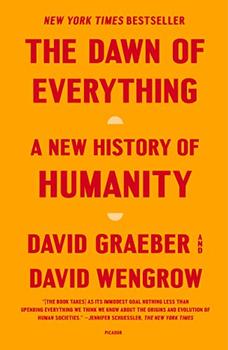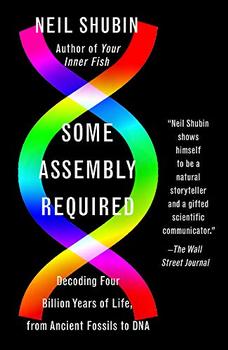Summary | Excerpt | Reading Guide | Reviews | Beyond the book | Read-Alikes | Genres & Themes | Author Bio

A Brief History of Humankind
by Yuval Noah HarariA groundbreaking narrative of humanity's creation and evolution that explores the ways in which biology and history have defined us and enhanced our understanding of what it means to be "human."
From a renowned historian comes a groundbreaking narrative of humanity's creation and evolution - a #1 international bestseller - that explores the ways in which biology and history have defined us and enhanced our understanding of what it means to be "human."
One hundred thousand years ago, at least six different species of humans inhabited Earth. Yet today there is only one—homo sapiens. What happened to the others? And what may happen to us?
Most books about the history of humanity pursue either a historical or a biological approach, but Dr. Yuval Noah Harari breaks the mold with this highly original book that begins about 70,000 years ago with the appearance of modern cognition. From examining the role evolving humans have played in the global ecosystem to charting the rise of empires, Sapiens integrates history and science to reconsider accepted narratives, connect past developments with contemporary concerns, and examine specific events within the context of larger ideas.
Dr. Harari also compels us to look ahead, because over the last few decades humans have begun to bend laws of natural selection that have governed life for the past four billion years. We are acquiring the ability to design not only the world around us, but also ourselves. Where is this leading us, and what do we want to become?
Featuring 27 photographs, 6 maps, and 25 illustrations/diagrams, this provocative and insightful work is sure to spark debate and is essential reading for aficionados of Jared Diamond, James Gleick, Matt Ridley, Robert Wright, and Sharon Moalem.
While Sapiens: A Brief History of Humankind wouldn't be possible without the innovations and discoveries of our predecessors, it is also a book which proves that it is not beyond the abilities of one man to distill such a huge expanse of history into a single articulate and highly readable volume, even if such a process at times necessarily lends itself to sweeping generalization and a certain oversimplification of statement. Harahi's fierce, almost iconoclastic independence of mind is very much in evidence. He is not afraid to put forward his own interesting — if sometimes overly radical — theories about our past and our possible future. By debunking some deeply held evolutionary myths, he makes us question everything we thought we knew about the human story...continued
Full Review
(781 words)
This review is available to non-members for a limited time. For full access,
become a member today.
(Reviewed by Sinéad Fitzgibbon).
In Sapiens: A Brief History of Humankind, Yuval Noah Harahi identifies three specific "revolutions" which were central to the development of the human species. The first was the Cognitive Revolution; taking place between 70,000 and 30,000 years ago, it was responsible for the development and use of language. The second was the Agricultural Revolution which saw homo sapiens abandoning, approximately 12,000 years ago, traditional foraging in favor of farming and permanent settlements. Finally, there is the Scientific Revolution, a much more recent and ongoing phenomenon occurring within the last 500 years. The driving force behind this Scientific Revolution was what Harahi refers to as "the discovery of ignorance" - having realized and ...
This "beyond the book" feature is available to non-members for a limited time. Join today for full access.

If you liked Sapiens, try these:

by David Graeber, David Wengrow
Published 2023
A dramatically new understanding of human history, challenging our most fundamental assumptions about social evolution―from the development of agriculture and cities to the origins of the state, democracy, and inequality―and revealing new possibilities for human emancipation.

by Neil Shubin
Published 2021
The author of the best-selling Your Inner Fish gives us a lively and accessible account of the great transformations in the history of life on Earth--a new view of the evolution of human and animal life that explains how the incredible diversity of life on our planet came to be.